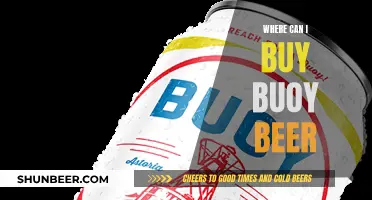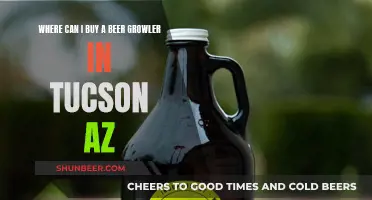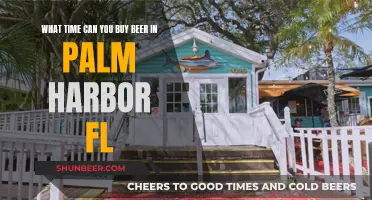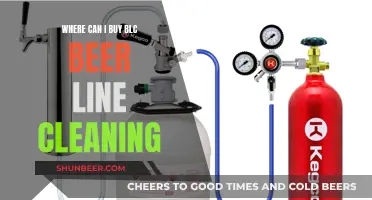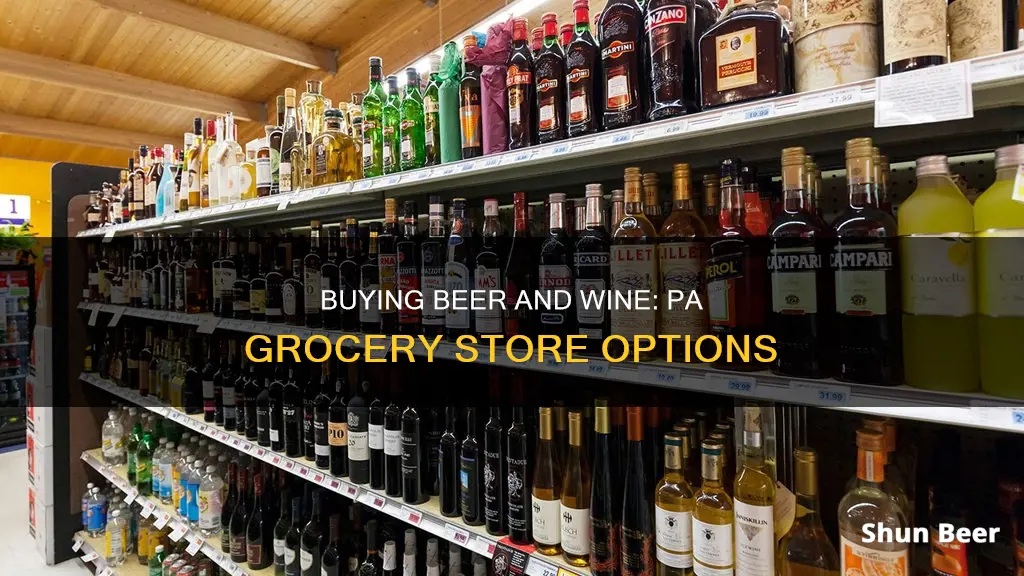
Pennsylvania's liquor laws have been described as restrictive and frustrating. The state's complex alcohol laws can be traced back to the Prohibition era and the stance of Gifford Pinchot, governor from 1923 to 1935, who was a teetotaler. Pinchot established the Pennsylvania Liquor Control Board and state liquor store system. However, in recent years, the state's liquor laws have loosened, making buying alcohol more convenient. In 2016, Governor Tom Wolf signed Acts 39 and 166 into law, loosening restrictions on beer and wine sales and allowing for expanded State Store hours. More recently, Governor Josh Shapiro signed bipartisan legislation allowing for the sale of ready-to-drink cocktails at grocery stores and gas stations.
| Characteristics | Values |
|---|---|
| Alcohol allowed to be sold in grocery stores | Beer and wine |
| Maximum amount of beer that can be sold per transaction | 192 fluid ounces |
| Maximum amount of wine that can be sold per transaction | 3 liters |
| Additional requirements for selling alcohol | Must be a licensed retailer with a restaurant liquor license |
| Age requirement to purchase alcohol | 21 years or older |
| ID requirements | Must present a valid, non-expired driver's license or passport |
| Other places where beer can be purchased | Distributors, bottle shops, bars, breweries |
| Other places where wine can be purchased | Wineries, bottle shops, grocery and convenience stores, bars |
What You'll Learn
- Where else can you buy alcohol in Pennsylvania?
- How much alcohol can you buy at a grocery store in Pennsylvania?
- What are the ID requirements when buying alcohol in Pennsylvania?
- What are the alcohol serving hours in Pennsylvania?
- What are the rules for drinking alcohol in a grocery store in Pennsylvania?

Where else can you buy alcohol in Pennsylvania?
Pennsylvania's liquor laws are notoriously complex and restrictive, so it's not always easy to understand where to buy alcohol. Here is a detailed guide on where else you can purchase alcohol in Pennsylvania besides grocery stores:
Fine Wine & Good Spirits Stores
Also known as state-owned liquor stores, these shops sell spirits and wine but not beer. There are over 600 of these stores across Pennsylvania, and they offer shipping and pick-up services. They are typically open from 9 AM to 10 PM from Monday to Saturday, with Sunday hours varying by location.
Beer Distributors
These establishments sell beer, including kegs, cases, 12-packs, 6-packs, single bottles, and growlers, intended for off-premise consumption. They have fewer restrictions compared to other retailers. Beverage distributors, which also sell soft drinks, may sell beer and malt liquor but not wine or spirits.
Bottle Shops
Bottle shops can obtain a license to sell up to 192 fluid ounces of beer (roughly 12 16-ounce cans) and up to 3 liters of wine (equivalent to four 750-milliliter bottles or one box of wine) per transaction.
Bars and Restaurants
Licensed bars and restaurants can sell you beer and wine to consume on-site or take away. They are permitted to sell up to 192 fluid ounces of beer and up to 3 liters of wine per purchase. Some restaurants attached to supermarkets also sell alcohol but must meet specific conditions, including having a separate seating area and cashier.
Breweries
Licensed breweries can sell you beer to drink on-site or take away, and they may also offer products from other Pennsylvania-licensed producers for on-site consumption.
Wineries
Wineries often have storefronts in shopping malls where they sell their wines. Some also provide local delivery options. Licensed wineries can ship up to 36 standard 9-liter cases of wine for personal use within the state.
Convenience Stores
Select locations of convenience store chains like Royal Farms, Rutter's, Sheetz, Turkey Hill, and Wawa sell beer and wine.
Delivery and Shipping Services
You can have beer, wine, and spirits delivered to your home or business through various services. Local breweries and wineries often provide delivery options, and some states stores also offer shipping. Additionally, services like GoPuff, Quick Sip Delivery, and Tavour can deliver beer to your doorstep.
Buying Beer Late Night in Oklahoma: What's the Deal?
You may want to see also

How much alcohol can you buy at a grocery store in Pennsylvania?
Pennsylvania's liquor laws have been described as restrictive and frustrating. The state's complex alcohol laws can be traced back to the Prohibition era and Governor Gifford Pinchot, who was a teetotaler. Pinchot established the Pennsylvania Liquor Control Board, which licenses establishments, sets serving hours, and regulates prices.
In terms of how much alcohol you can buy at a grocery store in Pennsylvania, it depends on the type of alcohol and the license the store has. For beer, grocery stores can sell up to 192 fluid ounces per transaction, which is equivalent to 12 16-ounce cans. You can buy more, but you will need to make a separate transaction for each 192 fluid ounces. For wine, you can buy up to 3 liters per transaction, which is equivalent to four 750-milliliter bottles or one box of wine. Again, you can purchase more, but it will require multiple transactions.
It is important to note that not all grocery stores in Pennsylvania sell alcohol. Additionally, there may be specific checkout procedures for purchasing alcohol at a grocery store, such as designated lanes or counters. Some stores may also require you to show ID and be over the age of 21 to purchase alcohol.
Buying Beer and Wine in South Carolina on Sundays
You may want to see also

What are the ID requirements when buying alcohol in Pennsylvania?
Pennsylvania's alcohol laws are among the most restrictive in the nation, with a complex history that can be traced back to the Prohibition era. The state's liquor laws have recently loosened, but ID requirements remain strict.
To buy alcohol in Pennsylvania, individuals must present valid government-issued photo identification. The Liquor Control Board (LCB) regulates the sale of alcohol in the state and has strict requirements for acceptable forms of ID. These include:
- A current, non-expired state-issued driver's license
- A state-issued ID card
- A passport
- A military ID card
- A tribal ID card
The ID must include the holder's date of birth, a clear photograph, and an expiration date. The LCB may also accept other forms of ID that meet these requirements.
It is important to note that Pennsylvania's alcohol laws vary depending on the type of establishment and the license they hold. For example, beer distributors have different restrictions than bottle shops, grocery stores, and bars. Additionally, there are limits on the amount of alcohol that can be purchased in a single transaction, and these limits vary by type of alcohol and establishment.
When purchasing alcohol, individuals should be prepared to present their ID to the cashier, as they will likely scan or check it before completing the sale. It is also worth noting that Pennsylvania has strict laws regarding minors and alcohol. Minors are prohibited from purchasing, possessing, or consuming alcohol, and those under 21 are not allowed in establishments that primarily sell alcohol, such as bars, unless accompanied by a parent or guardian.
Ohio's Non-Alcoholic Beer Buying Laws for Under 21s
You may want to see also

What are the alcohol serving hours in Pennsylvania?
The alcohol laws in Pennsylvania are considered some of the strictest in the United States. The state's complex alcohol laws can be traced back to the Prohibition era and the "dry" stance of Gifford Pinchot, governor from 1923 to 1935. The Pennsylvania Liquor Control Board was created to license establishments, set serving hours, and regulate prices.
For both types of retail licenses, serving hours are from 7:00 am to 2:00 am Monday through Saturday, and from 11:00 am to 2:00 am on Sunday, provided the establishment has a Sunday Sales Permit. There are further exceptions where establishments can serve earlier than 11:00 am. All entertainment (e.g. live bands) must cease at 2:00 am.
The primary purpose of a Restaurant (R) Liquor License is to provide food service to the public, with the service of liquor, wine, or beer products being secondary. Establishments with this license are commonly referred to as bars or taverns. They are open for business and alcohol sales from 7:00 am until 2:00 am the following morning, Monday through Saturday. No sales of alcoholic, malt, or brewed beverages can take place after 2:00 am, and all patrons must depart the premises by 2:30 am.
An Eating Place (E) Liquor License is for establishments whose primary purpose is the regular preparation and service of food. "E" licensees may only sell beer or its variants, and liquor and wine sales are forbidden. They are open for business and alcohol sales from 7:00 am until 2:00 am the following morning, Monday through Saturday. No sales of alcoholic, malt, or brewed beverages can take place after 2:00 am, and all patrons must depart the premises by 2:30 am.
A Hotel (H) Liquor License is for establishments that operate dining and alcohol service areas in the same manner as an "R" licensee. They are open for business and alcohol sales from 7:00 am until 2:00 am the following morning, Monday through Saturday. No sales of alcoholic, malt, or brewed beverages can take place after 2:00 am, and all patrons must depart the premises by 2:30 am.
A Club (C) or Catering Club (CC) Liquor License is for establishments that must operate for the good of the club membership and in a fraternal sense. Sales and the giving/furnishing of alcohol may begin at 7:00 am and must cease at 3:00 am. All patrons must depart the premises by 3:30 am. Clubs and catering clubs may be open 7 days a week.
A Distributor (D) Liquor License concerns neighborhood beer distributors. Sales are for off-premises consumption only and these sales must be made in original containers of no less than one case of twenty-four containers or seven ounces. These licensees may open at 2:00 am Monday and remain open continuously, 24 hours a day, until midnight Saturday. They must remain closed from 12:01 am Sunday through 2:00 am Monday.
Buying Beer in Georgia: 40 Oz and Legal?
You may want to see also

What are the rules for drinking alcohol in a grocery store in Pennsylvania?
Pennsylvania's liquor laws are considered some of the most restrictive in the United States. The state's complex alcohol laws can be traced back to the Prohibition era and the stance of Gifford Pinchot, governor from 1923 to 1935, who wanted to "discourage the purchase of alcoholic beverages by making it as inconvenient and expensive as possible".
Where to buy alcohol in a grocery store
Most grocery stores have a designated area or register for alcohol purchases. Some stores have a separate "beer cafe" or "alcohol section" with a register inside, while others have specific checkout lanes at the front of the store that are well-marked and allow alcohol purchases.
When to buy alcohol in a grocery store
The hours of operation for alcohol sales in grocery stores are typically restricted. Alcohol can be sold from 7:00 a.m. to 2:00 a.m. Monday through Saturday, and from 11:00 a.m. to 2:00 a.m. on Sunday, provided the store has a Sunday Sales Permit.
How much alcohol you can buy in a grocery store
The amount of alcohol you can buy in a grocery store depends on the type of license the store has. Grocery stores can obtain a "restaurant license" or a "wine expanded permit" to sell alcohol. Under the restaurant license, you can buy up to 192 fluid ounces of beer per transaction, which is equivalent to 12 16-ounce cans. For wine, you can buy up to 3 liters per transaction, or four 750-milliliter bottles. These totals for beer and wine can be combined in a single transaction, but no more. If you want to buy more, you will need to make another transaction and take each purchase outside the store before making the next one.
Who can buy alcohol in a grocery store
Only individuals who are 21 or older can purchase alcohol in a grocery store. A valid ID, such as a driver's license, passport, or military ID, is required to prove your age.
Where you can drink alcohol purchased in a grocery store
Alcohol purchased in a grocery store is for "off-premise consumption," meaning you cannot buy your drink and consume it inside the store. However, one user reported that it is possible to drink while shopping in a grocery store, but you may receive odd looks or comments from other shoppers.
Other rules for buying alcohol in a grocery store
- You cannot bring anyone under 21 with you when purchasing alcohol, even if they are family members or spouses.
- You must present your ID every time you buy alcohol, regardless of how old you look.
- You cannot leave the designated alcohol area without paying for your drinks first.
- You may be limited to buying a certain amount of alcohol at a time, such as two six-packs of beer, and will need to make another transaction for additional purchases.
- You may be required to take your alcohol purchases to your car before re-entering the store, depending on the store's policy.
Where to Buy Pacifico Beer in Maine?
You may want to see also
Frequently asked questions
Yes, you can buy wine and beer in PA grocery stores. However, there are quantity restrictions. You can buy up to 192 fluid ounces of beer (roughly 12 16-ounce cans) and 3 liters of wine (equivalent to four 750-milliliter bottles) per transaction.
Yes, you must be over the age of 21 and have a valid ID to purchase alcohol in PA. Additionally, different stores have different check-out procedures for alcohol. Some stores have a dedicated register or checkout area for alcohol, while others allow you to purchase alcohol at any register. It's important to familiarize yourself with the rules of the specific store you're shopping at.
No, liquor is only sold in state-owned Fine Wine & Good Spirits stores in PA. However, some grocery stores have restaurants attached to them that are permitted to sell small quantities of wine and beer.


